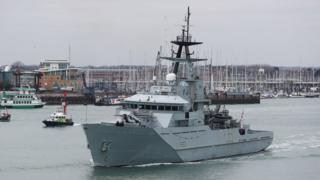
PA
Over 4,000 migrants have made it across the English Channel this year, crossing from France to the UK.
Tobias Ellwood MP, the chair of defence committee, has said that we need “permission to intercept these dinghies in international waters and take them back to the port they originated.”
Table Of Contents
What are international waters?
A country’s territorial waters stretch for 12 miles off its coast. Beyond that is international waters.
That means that the most popular route between Calais and Dover (because it is the shortest) is actually entirely in French or British territorial water.
If a boat carrying people is found within national waters it’s fairly clear-cut – that country has a duty to rescue them to a place of safety.
Who is responsible in international waters?
In international waters, it’s slightly less clear and may vary on a case by case basis. But there is still a legal obligation to rescue those in distress and take them to a place of safety.
Further down the Channel, where it widens out, the waters outside of the two countries’ territories are divided up into French and English search-and-rescue zones.
These rescue zones – which roughly divide the area of the Channel in half between the two countries – are co-ordinated by operations centres in Dover in the UK and Gris Nez (between Calais and Boulogne) in northern France.
It’s the responsibility of the authorities there to ensure that anyone in distress in these zones receives assistance. In reality, if people are in danger, any boat nearby will have a duty to rescue them.
Channel crossings by migrants in small boats
Number of people reaching the UK each month since July 2019
Those picked up in the UK zone will be taken to an English port and those in the French zone to a port in France.
Where can they seek asylum?
Under international law, people have the right to seek asylum in whichever country they arrive. There’s nothing to say you must seek asylum in the first safe country.
However, under EU law there is a provision to allow asylum applications to be transferred to another member state.
The Dublin Regulation states that a person’s asylum claim can be transferred to the first member state they entered.
In 2019, according to the European Council of Refugees and Exiles, 715 people were transferred to the UK from another EU country under the Dublin rules, and 263 were transferred (from 3,258 requests) out of the UK.
The UK grants refugee status to those who are unable to live in their own country for fear of persecution because of race, religion, nationality, political opinion or other factors such as sexual orientation. A successful application usually allows someone leave to remain for five years with the opportunity after that to apply for indefinite leave to remain.
Top 10 asylum seeking countries by success rate
Percentage of initial decisions ending in asylum being granted, 2018
Entry into the original EU country must be proven – so if someone has travelled through mainland European without being fingerprinted and doesn’t appear in the shared European fingerprint database, then they cannot be sent back.
If someone already has an asylum claim underway in another country, there will be a dialogue between those two countries about who is responsible.
If an asylum claim in another EU country has already been unsuccessful, the claimant has to prove that this decision was made unfairly or that their circumstances had changed since the decision was made.
Migrants coming from Calais, for example, are likely to have already made an application there according to immigration lawyer, Marcia Longdon.
Children can also be transferred under Dublin Regulations to a member state if they have relatives living there who are capable of taking care of them.
Since the Dublin protocols are an EU mechanism, the UK will no longer be a part of it if it does not strike a deal on the issue before the end of the transition period on 31 December 2020.
UK and French ministers are meeting to discuss how to deal with the issue.
Prime Minister Boris Johnson has pledged to work with the French authorities to discourage people from making the “dangerous” journey across the channel.
But he added the UK also needed to look at “the panoply of laws that an illegal immigrant has at his or her disposal that allow them to stay here”.
A note on terminology: The BBC uses the term migrant to refer to all people on the move who have yet to complete the legal process of claiming asylum. This group includes people fleeing war-torn countries, who are likely to be granted refugee status, as well as people who are seeking jobs and better lives, who governments are likely to rule are economic migrants.
UPDATE – This article was first was published on 4 January 2019.